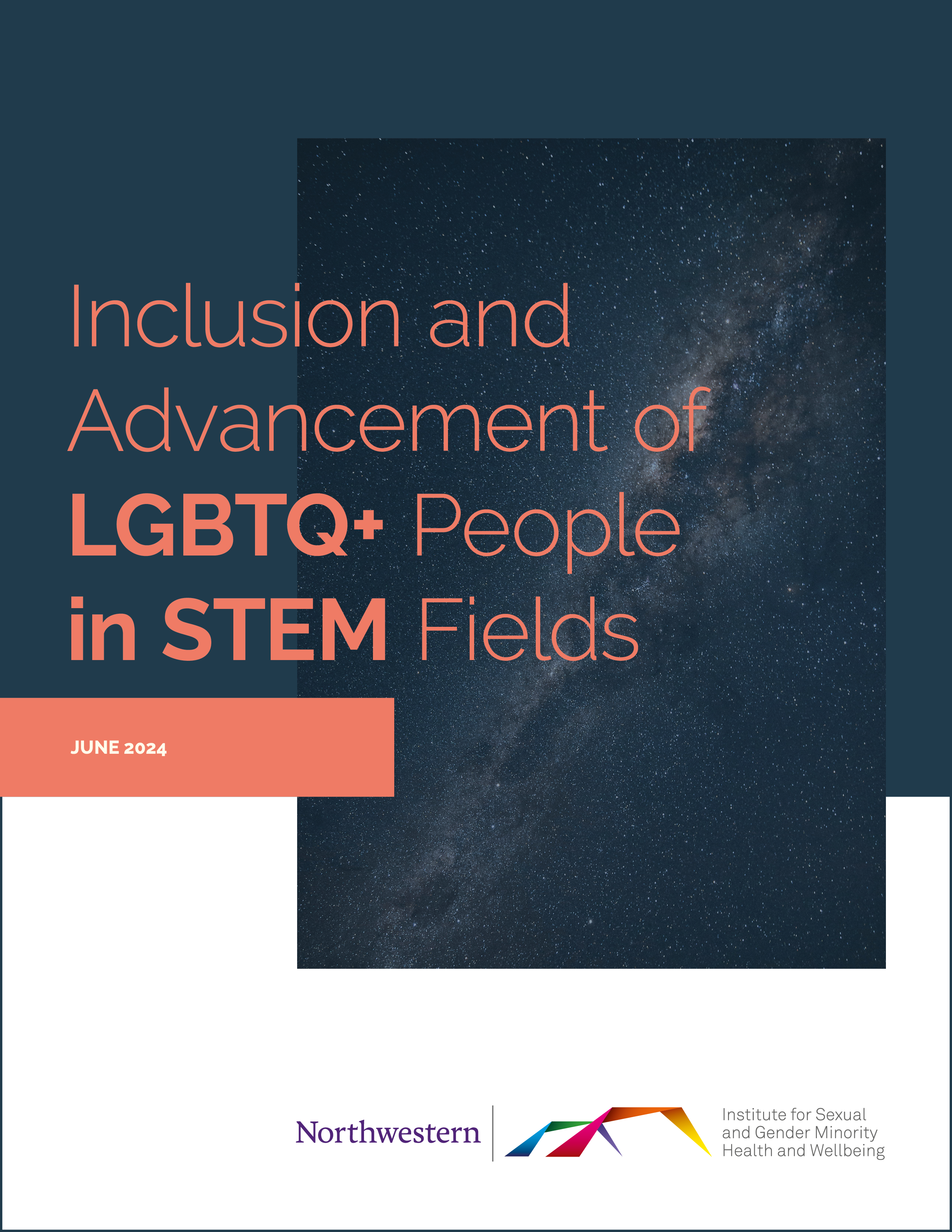Inclusion and Advancement of LGBTQ+ People in STEM Fields
By Jagadīśa-devaśrī Dācus, Tracy Baim, and Brian Mustanski
Research shows LGBTQ+ people in science, technology, engineering, and mathematics (STEM) fields face substantial barriers to participation and inclusion.
Although there is growing understanding of the barriers at each stage of the STEM education pathway, LGBTQ+ people have not yet been incorporated into federal and academic definitions of underrepresented and marginalized groups in the sciences. As a result, researchers concerned about the experiences of LGBTQ+ scientists have collected their own data, without the support of federal agencies, which have the resources to fund and support large-scale efforts.
Numerous studies cited in this report show that LGBTQ+ people experience higher rates of discrimination and harassment than the general population. These experiences vary based on people’s specific, individual identities as well as their multiplicatively oppressed identities.
This report calls for a comprehensive effort for collecting these data at all levels of research, and for policies and programs to remediate barriers to inclusion. In addition to the inclusion of sexual orientation and gender identity (SOGI) data collection in federal research, this report includes a wide range of policy and practice recommendations for all educational levels, workplaces, scientific societies, funding entities, advocacy organizations, and more.
As the culmination of the Inclusion and Advancement of LGBTQ+ People in STEM Fields Symposium and Think Tank which took place in May 2023, this report represents the contributions of more than two dozen researchers, professional organizations, policymakers, and community members.
The evidence summarized in this report reveals the clear and urgent reality of the inclusion and representation issues facing LGBTQ+ people in STEM fields. This must change if we are to realize a diverse scientific workforce that can contribute their unique perspectives to innovating for the future and solving society’s most pressing issues.”
Brian Mustanski, PhD
Director, Institute for Sexual and Gender Minority Health and Wellbeing
Professor of Medical Social Sciences, Medicine-Infectious Diseases, Psychiatry and Behavioral Sciences, and Psychology
Recommendations
This report includes a series of recommendations for addressing representation of LGBTQ+ people across STEM fields at all levels of education and employment. These recommendations provide guidance on how educational institutions, workplaces, and federal agencies can better collect SOGI data and can foster environments in which LGBTQ+ people are valued and respected. Implementation of the recommendations is critical for greater inclusion and advancement of LGBTQ+ people in STEM.
- Include LGBTQ+ people as an underrepresented population in federal workforce diversity initiatives and scientific educational diversity initiatives. Despite growing understanding of barriers LGBTQ+ people face in STEM, they have not yet been incorporated into federal and academic definitions of underrepresented and marginalized groups.
- Use language such as “SOGI data collection” as the descriptor for categorizing demographic measures of sexual orientation and gender identity. Disaggregation of sexual orientation (e.g., lesbian, gay, bisexual, heterosexual) and gender identity (e.g., transgender, cisgender, nonbinary) variables is important, as combining them can obscure findings in aggregate data.
- Collect SOGI data as part of national tracking surveys. This will help to identify key points along the STEM career pathway at which barriers or facilitators have the most impact on LGBTQ+ people’s persistence and success.
- Diversify memberships of scientific and professional associations and societies to increase visibility of LGBTQ+ people in STEM. Visible inclusion of LGBTQ+ individuals as members of honorific scientific societies (e.g., NASEM, American Academy of Arts and Sciences) is of particular importance for role modeling the success and advancing the careers of LGBTQ+ people in STEM, given the well-documented hurdles on the STEM pathway.
- Conduct a broader needs assessment of what LGBTQ+ people need to be successful in STEM workplaces. Assessments can improve our understanding of the STEM workplace landscape and help address barriers to full LGBTQ+ participation.
- Enforce Title IX's prohibition on discrimination on the basis of sex, including sexual orientation and gender identity, at all levels of education. Schools, colleges, and universities should follow the US Department of Education interpretation of Title IX's prohibition on discrimination on the basis of sex to include sexual orientation and gender identity in any education program or activity offered by a recipient of federal financial assistance.
- Incorporate LGBTQ+ content in high school STEM curricula. High school can be the critical time for engaging LGBTQ+ students interested in STEM, particularly if they do not see themselves represented.
Read the full report for additional recommendations.
